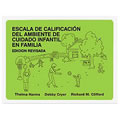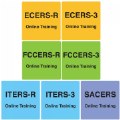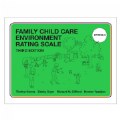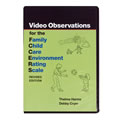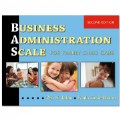The increasing concern over the effect of child care on children's lives has focused attention on the quality of that care. Since most out-of-home care is provided in family child care homes, the need has grown for an accessible, reliable, and thorough means of assessing the quality and suitability of such settings. Developed through lengthy field testing, research, and revision, the Family Child Care Environmental Rating Scale® consists of 32 items, organized under six major headings: Space and Furnishings for Care and Learning, Basic Care, Language and Reasoning, Learning Activities, Social Development, and Adult Needs.
Click here for Online Training
ERS® and Environment Rating Scale® are registered trademarks of Teachers College, Columbia University
Debby Cryer
 Debby Cryer, Ph.D., is a Scientist at the Frank Porter Graham Child Development Institute, University of North Carolina at Chapel Hill. She has taught in a variety of early childhood programs, recently directed the child care program at the FPG Center, and has studied and written about early childhood program quality for more than twenty years. Throughout her career, she has combined her interests as an early childhood practitioner with those of a researcher, studying real-world issues and translating research findings into practice for early childhood program staff, parents, and policy makers.
Debby Cryer, Ph.D., is a Scientist at the Frank Porter Graham Child Development Institute, University of North Carolina at Chapel Hill. She has taught in a variety of early childhood programs, recently directed the child care program at the FPG Center, and has studied and written about early childhood program quality for more than twenty years. Throughout her career, she has combined her interests as an early childhood practitioner with those of a researcher, studying real-world issues and translating research findings into practice for early childhood program staff, parents, and policy makers.
Dr. Cryer is co-author of the Infant/Toddler Environment Rating Scale®, (Harms, Cryer & Clifford, 1990) and the Early Childhood Environment Rating Scale®, Revised Edition (Harms, Clifford & Cryer, 1998) and has worked with various teams to develop numerous other quality assessment instruments. She has developed a variety of resources for teachers and for others interested in early child care and education, such as the popular Active Learning Series (Cryer, Harms & Bourland, 1986, 1987; Cryer, Harms, Ray, 1996), and the award-winning public television series, "Raising America's Children" (Harms & Cryer, 1988). Her most recent books include Infants and Toddlers in Out-of-Home Care (edited by Cryer & Harms, 2000), and the Early Childhood Education and Care in the USA (edited by Cryer & Clifford, 2003), both published by Paul H. Brookes.
Dr. Cryer was a Principal Investigator for the national study on Cost, Quality and Child Outcomes in Child Care Centers, and continues that research in the International Child Care and Education Study. She is currently Principal Investigator of two studies investigating the effects of continuity of caregivers on infants and toddlers in child care.
Thelma Harms
 Thelma Harms, Ph.D., is Director of Curriculum Development at the Frank Porter Graham Child Development Institute and Research Professor in the School of Education at the University of North Carolina at Chapel Hill, where she has been since 1975. She earned an M. A. in Child Development and a Ph. D. in Early Childhood Education at the University of California at Berkeley, where she served as a head teacher in the Harold E. Jones Child Study Center laboratory school for 15 years. Dr. Harms has lectured and conducted training throughout the U.S. as well as in Canada, Germany, Portugal, Sweden, Hong Kong, Singapore, South Korea, and Russia. Her areas of specialization are program evaluation, curriculum, and staff development.
Thelma Harms, Ph.D., is Director of Curriculum Development at the Frank Porter Graham Child Development Institute and Research Professor in the School of Education at the University of North Carolina at Chapel Hill, where she has been since 1975. She earned an M. A. in Child Development and a Ph. D. in Early Childhood Education at the University of California at Berkeley, where she served as a head teacher in the Harold E. Jones Child Study Center laboratory school for 15 years. Dr. Harms has lectured and conducted training throughout the U.S. as well as in Canada, Germany, Portugal, Sweden, Hong Kong, Singapore, South Korea, and Russia. Her areas of specialization are program evaluation, curriculum, and staff development.
Dr. Harms is the lead author of four widely used program evaluation instruments: the ECERS-R™ (Harms, Clifford, & Cryer, 1998); the FDCRS (Harms & Clifford, 1989); the ITERS-R™ (Harms, Cryer & Clifford, 2003); and the SACERS™ (Harms, Jacobs, & White, 1996). She consulted with the National Association for the Education of Young Children (NAEYC) in the development of its center accreditation instruments and validator training procedures and is a co-author of the school age child care assessment instrument, which is being used in the NSACA accreditation. Dr. Harms co-chaired the national committee that developed quality criteria for family child care programs and developed an accreditation process and instruments for military family child care.
Dr. Harms has co-authored a number of curriculum materials including: the Family Day Care Education Series; the seven volume Active Learning Series; the Cook and Learn Series, Nutrition Education for Preschoolers; and the 10-part educational television series, "Raising America's Children". She has co-edited a book on working with homeless preschool children in shelters and a recent volume on infants and toddlers in out of home care.
In addition to training courses offered through the Frank Porter Graham Child Development Institute in Chapel Hill, Dr. Harms provides training and consultation in collaboration with agencies in many other states and countries.
The Environment Rating Scales are internationally recognized tools used to assess and improve the quality of child care programs.
Using the Environment Rating Scale® to Construct a Program Improvement Plan
This session will demonstrate to attendees how to produce program improvement plans based on the Environment Rating Scale®. Participants will be shown how to use scores to formulate a plan that gives detailed, specific recommendations for quality improvement while identifying the provider’s strengths. Strategies and suggestions for conducting successful consultations with teachers and directors will also be provided.
Environment Rating Scales in Practice
During this session, participants will learn about the specific scale, interpretation of specific indicators, and the research and rationale for the requirements. Participants will review the sub-scales of the Environment Rating Scales through discussions, video clips, and hands on activities. Some instruction in scoring and completing an observation will be provided.
Flexibility and the Meaning of Environment Rating Scales
There are many things that affect the care and education that is provided to children in child care. Cultural differences, curriculum, conditions of building, and finances are just a few of the things that will affect the Environment Rating that a program will earn. It is important for programs to keep in mind that the total score in a classroom is more important than an individual indicator score. This session will show participants how to make well-informed decisions on areas to emphasize classroom strengths while minimizing areas of weakness.
Orientation to the Environment Rating Scale®
Having an environment rating scale observation can be daunting even for the most seasoned teacher. This session will walk participants through the scale and observation process. Participants will be instructed on conducting a self-assessment as well as the importance of emphasizing strengths to increase overall scores.
For more information on this or other KAPLAN professional development options, please contact us at 800.334.2014 or [email protected].

 Debby Cryer, Ph.D., is a Scientist at the Frank Porter Graham Child Development Institute, University of North Carolina at Chapel Hill. She has taught in a variety of early childhood programs, recently directed the child care program at the FPG Center, and has studied and written about early childhood program quality for more than twenty years. Throughout her career, she has combined her interests as an early childhood practitioner with those of a researcher, studying real-world issues and translating research findings into practice for early childhood program staff, parents, and policy makers.
Debby Cryer, Ph.D., is a Scientist at the Frank Porter Graham Child Development Institute, University of North Carolina at Chapel Hill. She has taught in a variety of early childhood programs, recently directed the child care program at the FPG Center, and has studied and written about early childhood program quality for more than twenty years. Throughout her career, she has combined her interests as an early childhood practitioner with those of a researcher, studying real-world issues and translating research findings into practice for early childhood program staff, parents, and policy makers.  Thelma Harms, Ph.D., is Director of Curriculum Development at the Frank Porter Graham Child Development Institute and Research Professor in the School of Education at the University of North Carolina at Chapel Hill, where she has been since 1975. She earned an M. A. in Child Development and a Ph. D. in Early Childhood Education at the University of California at Berkeley, where she served as a head teacher in the Harold E. Jones Child Study Center laboratory school for 15 years. Dr. Harms has lectured and conducted training throughout the U.S. as well as in Canada, Germany, Portugal, Sweden, Hong Kong, Singapore, South Korea, and Russia. Her areas of specialization are program evaluation, curriculum, and staff development.
Thelma Harms, Ph.D., is Director of Curriculum Development at the Frank Porter Graham Child Development Institute and Research Professor in the School of Education at the University of North Carolina at Chapel Hill, where she has been since 1975. She earned an M. A. in Child Development and a Ph. D. in Early Childhood Education at the University of California at Berkeley, where she served as a head teacher in the Harold E. Jones Child Study Center laboratory school for 15 years. Dr. Harms has lectured and conducted training throughout the U.S. as well as in Canada, Germany, Portugal, Sweden, Hong Kong, Singapore, South Korea, and Russia. Her areas of specialization are program evaluation, curriculum, and staff development.
